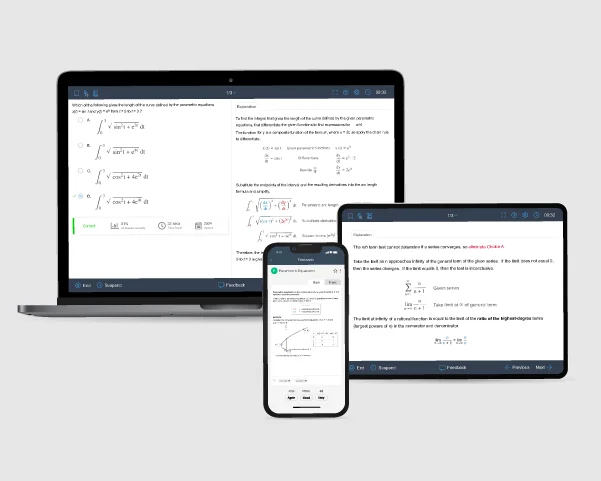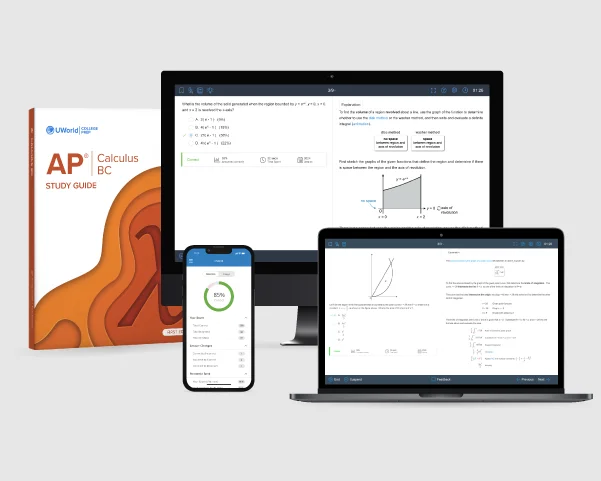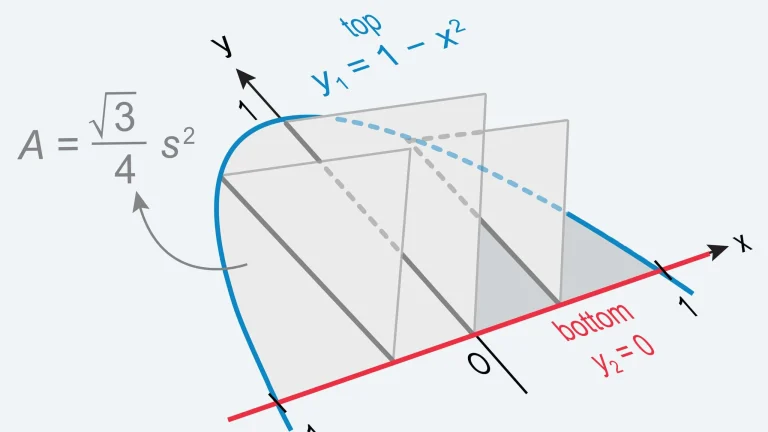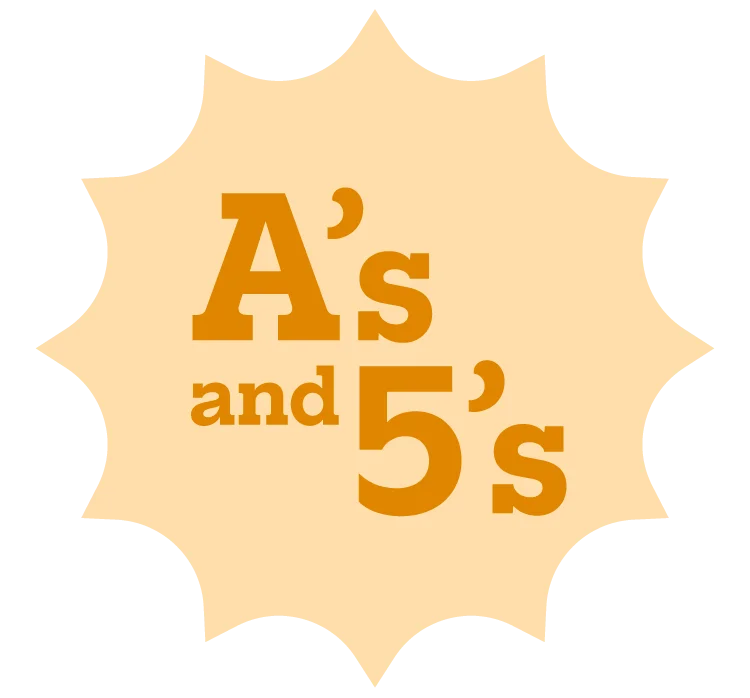If you are taking the AP® Calculus BC exam soon and are curious about its scoring pattern, this article will guide you through the nitty-gritty of the AP Calculus BC scoring system. Let’s explore!
How Is the AP Calculus BC Exam Scored?
The AP Calculus BC exam consists of 2 sections, each contributing 50% to the total composite score. Section I is the multiple-choice section (MCQ), while Section II is the free-response section (FRQ). Below is the structure for the exam:
| Sections | Part A | Part B | Total Questions | Total Time | ||
|---|---|---|---|---|---|---|
| Section I | 30 | 60 mins | 15 | 45 mins | 45 MCQs | 1 hour 45 mins |
| Section II | 2 | 30 mins | 4 | 60 mins | 6 FRQs | 1 hour 30 mins |
Your total points from each section are added to give you a composite score, which is then converted to an AP score on a scale of 1 to 5. The College Board® does not publish your composite score; you will only see your final AP score on the 1–5 scale.
Explore our AP Calculus BC Practice Questions to prepare effectively for the MCQ and FRQ sections. These include exam-level questions and detailed explanations to sharpen your skills.
AP Calculus BC Scoring Table
Your AP Calculus BC exam scores are sent to the colleges of your choice after they've been recorded on the AP grading scale. To estimate your scores, you can use our AP Calc BC score calculator for an approximate prediction. To know how to have the College Board send your scores directly to colleges, refer to our AP Exam Scores page.
Each college has its own criteria for admitting students based on AP scores. However, most colleges use a standard formula to convert your AP Calculus BC score to the equivalent college grade. The following score table shows the conversion of AP scores into equivalent college grades for Calculus BC:
| AP Exam Score | College Grade Equivalent | Qualification |
|---|---|---|
| 5 | A+ or A | Extremely well qualified |
| 4 | A-, B+, or B | Very well qualified |
| 3 | B-, C+, or C | Qualified |
| 2 | — | Possibly Qualified |
| 1 | — | No recommendation |
As you can see, colleges do not typically consider scores below 3 to grant college credits, Advanced Placement®, or admissions. Therefore, aiming for an AP score of 3 or higher is advised if you wish to earn college credits and advanced placement. Nevertheless, always check with the colleges about their minimum AP score requirements before you start the application process.
If you're looking for a resource to better understand scoring criteria and boost your preparation, check out our AP Calculus BC Study Guide in print and digital formats.
Recent research on students who score 2 in AP Calculus BC found that they earn significantly higher grades when taking the course in college than students with the same high school GPA!
AP Calculus BC Score Distribution
AP Calculus BC remains a rigorous yet rewarding course for students pursuing math-intensive fields. In 2025, the exam was taken by 160,436 students, a notable increase from 148,191 in 2024.Despite its challenging content, AP Calculus BC consistently has one of the highest success rates among all AP courses. In 2025, 78.6% of students scored a 3 or higher, and an impressive 44% of test-takers scored a 5.
If you're considering the AP Calculus BC exam, understanding the score distribution can help you evaluate overall student performance and set realistic goals for your preparation. Our AP Calculus BC exam guide will assist you in determining whether Calculus BC is the right subject for you.
Here’s the AP Calculus BC score distribution for the past 3 years:
| AP Score | 2025 | 2024 | 2023 |
|---|---|---|---|
| 5 | 44.0% | 47.7% | 43.5% |
| 4 | 21.9% | 21.1% | 15.9% |
| 3 | 12.8% | 12.1% | 19.0% |
| 2 | 15.2% | 13.9% | 15.2% |
| 1 | 6.2% | 5.2% | 6.3% |
| 3+ | 78.6% | 80.9% | 78.5% |
Although the success rates for the AP Calculus BC exam remain higher than other AP exams like AP Biology, AP Chemistry, or AP Calculus AB, trends over the past few years reveal fluctuations. The pass rates improved slightly in 2022 to 2024 as compared to 2021, with 76.9% in 2022, 78.5% in 2023, and 80.9% in 2024. However, 2025 witnessed a slight downfall, with 78.6% of test-takers earning a score of 3 or higher.
Scoring pattern for AP Calculus BC exams
The 2025 AP Calculus BC exam revealed several key performance trends:
Multiple-Choice Questions (MCQs)
- Students showed strong overall performance on the MCQ section, reflected in the distribution of high scores (many 4s and 5s). Overall mastery across BC curriculum concepts appears solid
Free-Response Questions (FRQs)
- Students performed relatively well on problems involving setting up and evaluating integrals, interpreting rates of change, and modeling in applied contexts.
- Parts requiring numerical evaluation or straightforward use of technology also tended to have higher scores.
Areas Where Students Struggled:
- Students struggled most with justification and explanation steps, particularly when asked to provide global reasoning or multi-step arguments.
- Errors commonly included confusing integrals of a function with integrals of its derivative, missetting limits of integration, and stopping short on reasoning rather than providing a complete argument.
Overall, BC students were strongest in integral setup, evaluation, and applied rate problems, while deep justification and multi-step reasoning were the most challenging areas on FRQs.

AP Calculus BC Minimum Score Requirement for College Credits
Most colleges in the US recognize AP exam scores for credit or advanced placement. A score of 3 or higher can allow you to skip introductory math courses, earn credit, or both, depending on the institution. Some colleges accept a score of 3, while others require a 5. Certain schools grant placement but no credit for your AP score. Knowing your target college's AP score requirements is essential while preparing for the AP Calculus BC exam.
Here is a list of institutions and their AP score requirements.
| Institution | AP Score |
|---|---|
| California State University: Los Angeles | 3 |
| Grinnell College | 4 |
| Harvard University | 5 |
| Louisiana State University | 3 |
| Massachusetts Institute of Technology | 5 |
| Mississippi State University | 3 |
| New York University | 3 |
| Notre Dame | 5 |
| Reed College | 4 |
| Stanford University | 5 |
| Truman State University | 3 |
|
UCLA (School of Letters and Science) |
4 |
| Yale University | 5 |
Frequently Asked Questions
What is a good AP Calculus BC score?
Scoring a 5 on your AP Calculus BC exam is the top score. Typically, scores of 3 or higher will qualify you for placement and college credits.
What is the average AP Calculus BC score?
The global mean score for the May 2025 administration of the AP Calculus BC exam was 3.82 out of 5.
Why are AP Calculus BC scores curved?
The AP Calculus BC scores are curved to ensure standardization and maintain consistency across exams administered across paper and digital media and at various times. This process also helps in ensuring that the AP exam scores translate into equivalent college grades.
When are AP Calculus BC scores released?
AP Calculus BC scores are released in July every year for the exams administered in May of that year.
How do I check my AP Calculus BC score?
You can easily check your AP Calculus BC scores on the College Board website. Visit apscore.org and log in to your College Board account. Fill in the blanks with your AP number and enter your AP number to view your AP scores.
How do I get a 5 on the AP Calculus BC exam?
The key to a 5 on your AP Calculus BC is understanding the concepts and practicing problems regularly. Prepare a study schedule, watch and read lessons about concepts and formulas you find challenging, and then practice solving these problems. Explore UWorld’s AP Calculus BC exam online prep for detailed lessons and custom practice tests to achieve your AP dream!

References
- AP Calculus BC Exam. (n.d.). apcentral.collegeboard.org. Retrieved from https://apcentral.collegeboard.org/courses/ap-calculus-bc/exam
- Past AP Calculus BC Score Distributions. (n.d.). apstudents.collegeboard.org. Retrieved from https://apstudents.collegeboard.org/about-ap-scores/score-distributions/ap-calculus-bc
- 2025 Chief Reader Report - AP Calculus AB and AP Calculus BC. (2025). apstudents.collegeboard.org. Retrieved from https://apstudents.collegeboard.org/about-ap-scores/score-distributions/ap-calculus-ab
- AP Credit Policy Search. (n.d.). apstudents.collegeboard.org. Retrieved from https://apstudents.collegeboard.org/getting-credit-placement/search-policies/course/28
Read More About AP Calculus BC Exam
Do you want to learn more about the format of the AP Calculus BC exam? Visit our page for a detailed breakdown of the format, question types, and other information!
AP Calculus BC Course and Exam DescriptionLooking for a summary of the College Board CED? Check out our easy-to-understand AP Chemistry CED for in-depth info on the exam, units, weightage, and key topics.
How to Study for AP Calculus BCWant to know the tips and tricks to score a 5 on AP Calculus BC? Our guide, written by industry experts, includes a comprehensive study plan that can help you with it.
Best AP Calculus BC Study Guide ComparisonDiscover expert insights into Kaplan, Barron's, Princeton Review, and UWorld. Learn how each resource compares to help you choose the best fit.
Best AP Calculus BC Prep Course ReviewSearching for top AP Calculus BC prep courses? Read this review to compare the best courses and choose the perfect one for your success.
How to Self-Study for AP Calculus BCWant to ace AP Calculus BC on your own? Follow this expert self-study guide with tips, tricks, and tools to prepare effectively for the exam.




